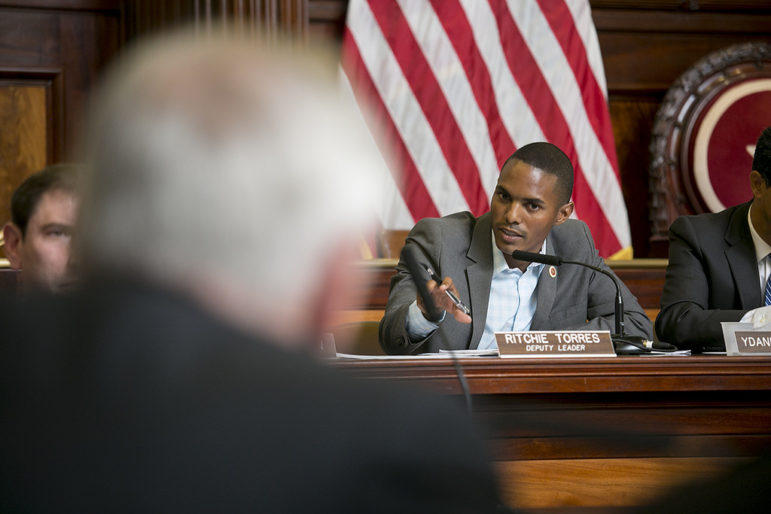
William Alatriste for the NYC Council
Ritchie Torres, seen at a 2014 Council hearing, says the newly empowered Oversight and Investigations Committee will aim to disrupt the 'inertia' that afflicts government.
Four weeks ago, Ritchie Torres was at center-stage in the most divisive episode of the last City Council: the debate over his bill to require, in many but not all circumstances, NYPD officers to provide a business card to people they stop. In the midst of Torres’s race for City Council, at the end of a four-year term with little public acrimony between the two sides of City Hall, the youthful Bronx Democrat found himself caught between the de Blasio administration and its police department on one side and, on the other, his traditional allies on the left.
The bill passed on December 19, albeit by a margin narrower than Council measures typically enjoy. Torres’ relationship with some of his progressive colleagues, who he says “blindsided” him, was damaged, and he resigned from the progressive caucus because, he now says, “I’ve come to value my independence.” By the end of that December week Corey Johnson had gained unstoppable momentum in the race for Speaker, and Torres’ candidacy was effectively over.
That last development, Torres now says, was “a blessing in disguise” because of the role Johnson has assigned him: chairman of a newly empowered Oversight and Investigations Committee.
That committee has long existed. In the past four years, it met 20 times, but made little impression. With plans to hire 10 to 15 investigators and make use of the Council’s subpoena powers, Torres’s committee will have bigger muscles and possibly sharper teeth.
In a conversation with Gotham Gazette’s Ben Max and this reporter, Torres on Wednesday acknowledged that Johnson will have final say over what the committee investigates, and that its focus will overlap somewhat with existing investigative bodies like the comptroller’s auditors, the public advocate’s office, the Department of Investigation and others. But he notes that his focus will be on “mismanagement rather than malfeasance.”
Torres said his initial focus would be on city departments, but that it could broaden to include non-mayoral agencies like the MTA and even private companies that have a contractual or regulatory relationship with city government.
There’s a complex relationship between the exposure of bad government and the public’s trust in the people it elects. Revealing incompetence and wrongdoing is important, but viewed in isolation, those revelations could fortify a belief that all government is inherently ineffective or corrupt. Instead of separating the wheat from the chaff, it all starts to look like chaff. Torres nodded to the “deep strain of cynicism” that his coming investigations could deepen; he also discusses below his belief that oversight is equal parts “advocacy and accountability.”








